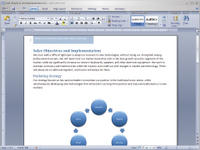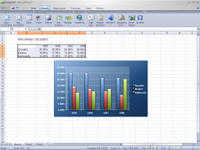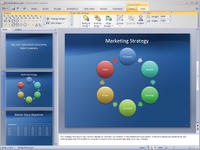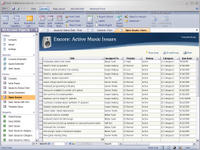Paul Thurrott's "Longhorn" Alpha Preview
Download Windows Vista Icon Editor
I've found this site
Download it
http://vista-icon-editor.com/
Open and extract compressed Vista icons.
Modify icons including the large 256x256 images.
Save Vista icons or convert them to XP icons.
Posted by Hunt3rke, 1:19 AM
| 1 comments |
Download it
http://vista-icon-editor.com/
RealWorld Icon Editor is the first icon maker with full Windows Vista support:
Open and extract compressed Vista icons.
Modify icons including the large 256x256 images.
Save Vista icons or convert them to XP icons.
Office 12 Screenshots
 The next version of Microsoft Word
The next version of Microsoft Word
 The next version of Microsoft Excel
The next version of Microsoft Excel
 The next version of Microsoft PowerPoint
The next version of Microsoft PowerPoint The next version of Microsoft Access
The next version of Microsoft Access
Windows Vista Beta 1 Screenshot Start Menu
 Windows Vista, abbreviated WinVI, is Microsoft's next version of its Windows operating system, succeeding to Windows XP. It was previously known by its codename Longhorn. See the Microsoft codenames list for the names of others. The name "Vista" was unveiled on July 22, 2005. Longhorn Server, the successor of Windows Server 2003, is yet to be named. Windows Vista will carry the version number 6.0 (Windows 2000, Windows XP and Windows Server 2003 being Windows NT versions 5.0, 5.1 and 5.2, respectively).
Windows Vista, abbreviated WinVI, is Microsoft's next version of its Windows operating system, succeeding to Windows XP. It was previously known by its codename Longhorn. See the Microsoft codenames list for the names of others. The name "Vista" was unveiled on July 22, 2005. Longhorn Server, the successor of Windows Server 2003, is yet to be named. Windows Vista will carry the version number 6.0 (Windows 2000, Windows XP and Windows Server 2003 being Windows NT versions 5.0, 5.1 and 5.2, respectively).
Download Microsoft Windows Vista Themes and Wallpapers
Links here
www.themexp.org
http://www.xptheme.info/resources_view.cfm/hurl/restype_id=999/viewnum=4/search=vista/
Posted by Hunt3rke, Wednesday, September 21, 2005 9:58 AM
| 0 comments |
www.themexp.org
http://www.xptheme.info/resources_view.cfm/hurl/restype_id=999/viewnum=4/search=vista/
Microsoft Windows Vista Hardware requirements
No complete details of Vista's hardware requirements have yet been revealed by Microsoft beyond general recommendations and guidelines.
The guidelines for Beta 1 give this basic list of requirements: [5]
Microsoft expanded on these basic requirements at its TechEd 2005 conference on Australia's Gold Coast in August 2005. Microsoft strategist Nigel Page said, for Aero Glass users would need a video card with 256 MB or more of RAM, for the 64-bit version of Vista they would need 2 GB of DDR3 RAM, and for increased performance all round users will need a hard drive with the native command queuing (NCQ) feature of Serial ATA 2.Microsoft Windows Vista Editions
- Windows Vista Starter Edition: (Only available in emerging markets) Much like the Windows XP Starter Edition, this edition will be limited to emerging markets mainly to offer a legal alternative to piracy. It will be severely limited, for example only allowing a user to launch at most three applications at once. This is the only edition that will not support 64-bit processors.
- Windows Vista Home Basic Edition: Similar to Windows XP Home Edition for budget users not requiring advanced media support for home use.
- Windows Vista Home Basic Edition N: (Only available in Europe) Identical to Windows Vista Home Basic Edition except Windows Media Player is not included. This edition is mandated by European law, to allow more competitiveness among media applications available for Windows.
- Windows Vista Home Premium Edition: Based on the Windows Vista Home Basic Edition, this edition will additionally support more advanced features aimed for the home market segment, such as HDTV support and DVD authoring. This edition will be comparable to a Windows XP Home edition combined with features from the Windows XP Media Center Edition and some additional features.
- Windows Vista Professional Edition: Comparable to Windows XP Professional, and aimed at the business market. Adding support for Windows Server domains, which all Home editions will lack. This edition will also come with the Internet Information Services web server in a new version.
- Windows Vista Professional Edition N: (Only available in Europe) Identical to Windows Vista Professional Edition except Windows Media Player is not included, for the same reason as with Home Basic Edition N.
- Windows Vista Small Business Edition: This edition is aimed for small businesses lacking an IT staff, and therefore comes with a number of integrated system maintenance features, although not necessarily enough to be comparable to a full fledged server. It will support backup and shadow copies, and also come with fax and scanning utilities, and a special version of Microsoft's upcoming antivirus tool Windows OneCare. It may also come with a pre-paid Microsoft Office Live! subscription.
- Windows Vista Enterprise Edition: (Only available through enterprise agreements) Aimed for the enterprise segment, and functionally like a superset of the Professional Edition, this edition will among other things ship with Microsoft's Virtual PC system virtualization software, and a multilingual user interface. This edition will not be available through retail or OEM's.
- Windows Vista Ultimate Edition: This edition will work as a superset of the Home and Professional editions and additionally come with podcasting support, a game performance tweaker, and possibly supporting special online services for e.g. downloadable media. The Ultimate Edition is aimed to be the most impressive edition of Vista, aimed for high-end PC users.
Windows Vista Overview
Windows Vista was originally expected to ship sometime early in 2006 as a minor step between Windows XP and Windows Blackcomb. Gradually, Vista assimilated many important new features and technologies of Blackcomb.
In August 2004, Microsoft announced that it was making changes to what was then only known as "Longhorn". Microsoft basically started development afresh, building on the Windows Server 2003 codebase. This decision was reached in the wake of Windows XP Service Pack 2. As part of this decision, Microsoft announced that it is delaying the release of WinFS so that Vista could be released in "a reasonable timeframe". Due to this, WinFS will not be included in Windows Vista.
Two beta versions of Windows Vista have been planned, the first released on July 27, 2005, and the second planned for release in Q4 2005, with release candidates to be released throughout 2006. The projected release date is more than five years after the release of Windows XP, making this the longest time span between releases of desktop versions of Microsoft's Windows operating system.
Vista Beta 1 (build 5112) is currently available to Microsoft Developer Network (MSDN) subscribers as well as a select group of Microsoft Beta testers and at select Microsoft developer conferences such as the Professional Developers Conference (PDC) and WinHEC. The preview release is classified as a beta version at the moment, although its feature set is not representative of the release product. Like many other products (including all Windows releases since Windows 98), it has since been leaked onto popular networks (file sharing or otherwise) such as IRC, BitTorrent and various newsgroups.
A beta refresh is being given to 2005 PDC attendees and has been released to Microsoft Beta testers with the build number 5219. This refresh contains the Windows Sidebar, which had been removed from previous builds without explanation. Build 5219 is expected to be the closest to Beta 2 the public will see before the actual release of Beta 2 later this year. It is expected to be released December 7th. Microsoft will however release less publicized monthly interim releases to developers during this time.
Posted by Hunt3rke, 8:26 AM
| 0 comments |
In August 2004, Microsoft announced that it was making changes to what was then only known as "Longhorn". Microsoft basically started development afresh, building on the Windows Server 2003 codebase. This decision was reached in the wake of Windows XP Service Pack 2. As part of this decision, Microsoft announced that it is delaying the release of WinFS so that Vista could be released in "a reasonable timeframe". Due to this, WinFS will not be included in Windows Vista.
Two beta versions of Windows Vista have been planned, the first released on July 27, 2005, and the second planned for release in Q4 2005, with release candidates to be released throughout 2006. The projected release date is more than five years after the release of Windows XP, making this the longest time span between releases of desktop versions of Microsoft's Windows operating system.
Vista Beta 1 (build 5112) is currently available to Microsoft Developer Network (MSDN) subscribers as well as a select group of Microsoft Beta testers and at select Microsoft developer conferences such as the Professional Developers Conference (PDC) and WinHEC. The preview release is classified as a beta version at the moment, although its feature set is not representative of the release product. Like many other products (including all Windows releases since Windows 98), it has since been leaked onto popular networks (file sharing or otherwise) such as IRC, BitTorrent and various newsgroups.
A beta refresh is being given to 2005 PDC attendees and has been released to Microsoft Beta testers with the build number 5219. This refresh contains the Windows Sidebar, which had been removed from previous builds without explanation. Build 5219 is expected to be the closest to Beta 2 the public will see before the actual release of Beta 2 later this year. It is expected to be released December 7th. Microsoft will however release less publicized monthly interim releases to developers during this time.
Windows Vista Bug
The following has been posted by
“There’s been some commentary the past couple of days regarding a potential Windows Vista virus and we wanted to weigh in with some details. First of all, in examining the details of the reports, there is no Windows Vista virus described in them. Instead, the reports are regarding potential proof of concept viruses in the form of malicious scripts that are developed to affect a new interactive shell codenamed ‘Monad’, which is currently in early phase of beta testing.
“Now to be clear, these reports pose no risk for Microsoft customers. The viruses do not attempt to exploit a software vulnerability and do not encompass a new method of attack. Furthermore, ‘Monad’ is not widely available for general use. It’s a beta, and we do not recommend or support the use of beta software in a production environment. Microsoft continues to analyze the feedback from testers as Monad continues to be developed.
“But most important, ‘Monad’ is not included in the beta release of Windows Vista or in Windows Server 2003 R2.
“Monad will not be included in the final version of Windows Vista and there is no relation between Monad and Windows Vista Beta 1. Monad is being considered for the Windows Operating System platform for the next three to five years. So these potential viruses do not affect Windows Vista or any other version of Windows if ‘Monad’ has not been installed on the system.
“It’s hard to predict what type of malicious software criminals might develop to attack future versions of operating systems. But rest assured we’re on the case! The MSRC will be here to investigate and provide the guidance to help protect customers no matter what attacks may impact customers.”
So that clears that one up.
“Now to be clear, these reports pose no risk for Microsoft customers. The viruses do not attempt to exploit a software vulnerability and do not encompass a new method of attack. Furthermore, ‘Monad’ is not widely available for general use. It’s a beta, and we do not recommend or support the use of beta software in a production environment. Microsoft continues to analyze the feedback from testers as Monad continues to be developed.
“But most important, ‘Monad’ is not included in the beta release of Windows Vista or in Windows Server 2003 R2.
“Monad will not be included in the final version of Windows Vista and there is no relation between Monad and Windows Vista Beta 1. Monad is being considered for the Windows Operating System platform for the next three to five years. So these potential viruses do not affect Windows Vista or any other version of Windows if ‘Monad’ has not been installed on the system.
“It’s hard to predict what type of malicious software criminals might develop to attack future versions of operating systems. But rest assured we’re on the case! The MSRC will be here to investigate and provide the guidance to help protect customers no matter what attacks may impact customers.”
So that clears that one up.
Windows Vista Start Menu Privacy Tweaks
Every time you open up a document or launch a program Windows Vista keeps track of this information to build the list of application for recently run applications and recent documents list. This can be a convenience or it can be a privacy problems if you use a shared computer. If that is the case, then anyone that uses the computer after you can see what applications you like to run and also see the name of the documents or photos that you looked at.
In Windows Vista Microsoft has provided a easy way to tweak this setting. Follow the steps below to protect your privacy:
~Right click on the taskbar and select Properties.
~Click on the Start Menu tab.
~Uncheck Store and display a list of recently opened files.
~Uncheck Store and display a list of recently opened programs.
~Hit OK and you are finished.
Now the applications that you launch and the documents & photos that you look at are no longer recorded.
Source www.tweakvista.com

